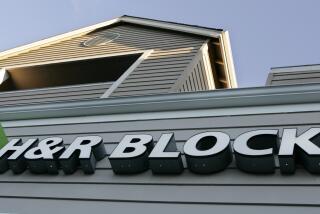10-Cent Dispute With IRS Costs Firm Plenty
- Share via
PHILADELPHIA — Nearly two years ago, Rohm & Haas Co., one of the nation’s largest chemical manufacturers, sent the Internal Revenue Service a $4,488,112.88 check for payroll taxes--and got into a $46,806.37 dispute over 10 cents.
The IRS claimed that the check was a dime short and wanted to penalize the company for the late payment. It sent Rohm & Haas a penalty bill of $46,806.37.
“Try and figure that one out,” said Thomas Friel, manager of corporate taxes for the company. “How do you explain it? It was so unbelievable.”
So began Rohm & Haas’ five-month effort to explain its side of the situation to the IRS service center here and get the matter settled.
An IRS spokesman, who preferred not to be identified, said Thursday that he couldn’t discuss a specific tax dispute.
The matter became a time-consuming, expensive proposition for Rohm & Haas. It assigned five accountants who wrote seven letters to officials at the center. It sent company representatives to the center to personally try to clarify the problem.
No Apology
Finally, the penalty was dropped.
Was there any apology or explanation?
“No,” said Friel. “They never admitted they were wrong.”
“No comment,” said the IRS spokesman.
The incident is one of a number of such stories uncovered by U.S. Senate and House committees looking into IRS procedures and allegations of employee insensitivity and inaction.
The probes surfaced after disclosures earlier this year that the Philadelphia center failed to properly credit more than $300 million in payroll tax deposits by some 26,000 businesses, which resulted in threatening collection letters and even seizures of corporate bank accounts.
In testimony recently in Washington, IRS Commissioner Roscoe Egger Jr. told a House committee that the problems in Philadelphia and the other eight national centers were due to a new computer and software and human error.
But taxpayers say the errors are symptomatic, not isolated, and stem from an apparently overloaded and uncaring system.
While declining to comment on any specific complaint, the IRS spokesman pointed out that the tax-collecting agency handles hundreds of millions of tax receipts and that errors are just “a tiny fraction.”
But Rohm & Haas has another problem it is still trying to resolve.
Overpaid Taxes
A month after settling the 10-cent case, it received a letter saying that the company had a tax credit of $4,570,462 that had been on IRS books for three years. The IRS said the company overpaid its 1977-78 corporate income taxes.
“We weren’t owed that money, and that was the first time that we had heard of it,” Friel said.
The same Jan. 7 letter to Rohm & Haas also said the government had seized $2.3 million of the credit to satisfy the company’s 1984 third-quarter employee withholding tax payment--which Rohm & Haas said it paid Oct. 1, 1984, but which was lost in a records snafu involving other mid-Atlantic companies.
After deducting a late-payment penalty for the payroll tax, the IRS, in another document dated Jan. 7, said it had deposited $32,595.97 in Rohm & Haas’ bank account.
When the company tried to tell the IRS that it had erred on the tax credit, the payroll tax payment, the penalty and the bank account deposit, Friel said: “The IRS agent couldn’t understand how we got the money. He told us that we could get in big trouble for having it.”
Friel said the latest dispute has not been resolved, although the company returned the $32,595.97 refund it mistakenly received to the IRS on Jan. 28 by certified mail.
More to Read
Inside the business of entertainment
The Wide Shot brings you news, analysis and insights on everything from streaming wars to production — and what it all means for the future.
You may occasionally receive promotional content from the Los Angeles Times.










